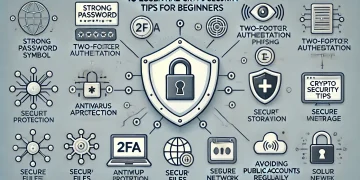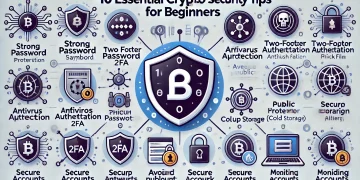Selecting the right cryptocurrency wallet is a crucial decision for anyone entering the crypto space. Your wallet serves as your gateway to the blockchain, securing your digital assets and enabling transactions. This comprehensive guide will walk you through the process of choosing a wallet that best fits your needs, taking into account security, convenience, and functionality.
Understanding Wallet Types
The journey to selecting the right crypto wallet begins with understanding the different types available. Hardware wallets provide the highest level of security by storing your private keys offline. These physical devices connect to your computer or smartphone when you need to make transactions, offering protection against online threats.
Software wallets, on the other hand, offer more convenience and accessibility. These can be further divided into desktop wallets, mobile wallets, and web wallets. Desktop wallets install directly on your computer, providing a good balance of security and usability. Mobile wallets bring cryptocurrency management to your smartphone, ideal for on-the-go transactions. Web wallets offer the most convenience, accessible from any device with an internet connection, though they generally provide less security than other options.
Assessing Your Needs
Before diving into specific wallet recommendations, take time to evaluate your requirements. Consider how you plan to use cryptocurrency. Are you a long-term investor looking to securely store large amounts? A trader needing quick access to funds? Or perhaps a developer working with smart contracts?
Think about the cryptocurrencies you plan to hold. Some wallets specialize in specific cryptocurrencies, while others support a wide range. If you’re interested in decentralized finance (DeFi) or NFTs, ensure your wallet supports these functionalities through Web3 capabilities.
Security Considerations
Security should be paramount in your wallet selection process. Look for wallets that provide robust security features such as:
- Strong encryption of private keys
- Two-factor authentication options
- Regular security audits and updates
- Open-source code for community review
Seed phrase backup is another critical security feature. Your wallet should generate a seed phrase during setup, allowing you to recover your funds if your device is lost or damaged. Some advanced wallets offer additional recovery options, such as social recovery or multi-signature setups.
User Experience and Interface
The best security features mean little if you find the wallet difficult to use. A well-designed user interface can significantly impact your cryptocurrency experience. Look for wallets with intuitive layouts, clear transaction processes, and helpful features like address books for frequent contacts.
Consider how the wallet handles transaction fees. Some wallets automatically suggest appropriate fees based on network conditions, while others let you set custom fees. The ability to adjust fees can be crucial during periods of network congestion.
Platform Compatibility
Ensure the wallet you choose works with your preferred devices and operating systems. Some wallets offer seamless synchronization across multiple devices, allowing you to access your funds from your computer, smartphone, or tablet. This can be particularly useful if you frequently switch between devices.
Popular Wallet Options
Hardware Wallets
Hardware wallets represent the gold standard for cryptocurrency security. Leading options include:
Ledger Nano Series: These compact devices support a vast array of cryptocurrencies and provide excellent security features. The Nano S Plus offers a good balance of functionality and affordability, while the Nano X adds Bluetooth connectivity for mobile use.
Trezor Models: Known for their user-friendly interface and strong security, Trezor wallets are popular among both beginners and experienced users. The Model T features a touchscreen for easier navigation and supports a wide range of cryptocurrencies.
Software Wallets
Software wallets offer various combinations of security and convenience:
MetaMask: Primarily focused on Ethereum and ERC-20 tokens, MetaMask has become the go-to wallet for DeFi and Web3 applications. Available as a browser extension and mobile app, it offers a good balance of accessibility and security.
Trust Wallet: A comprehensive mobile wallet supporting multiple blockchains, Trust Wallet is known for its intuitive interface and built-in DApp browser. It’s particularly popular among users who primarily manage their crypto through smartphones.
Advanced Features to Consider
As the cryptocurrency ecosystem evolves, wallets are adding more sophisticated features:
- Built-in exchanges for swapping cryptocurrencies
- Staking capabilities for earning passive income
- DApp browsers for interacting with decentralized applications
- Hardware wallet integration for enhanced security
Some wallets also offer advanced privacy features, such as coin mixing or integration with privacy-focused cryptocurrencies. Consider whether these features align with your needs and usage patterns.
Setting Up Your Wallet
Once you’ve chosen a wallet, proper setup is crucial:
- Download only from official sources
- Verify the authenticity of hardware wallets
- Use a strong password for software wallets
- Safely store your seed phrase offline
For hardware wallets, consider purchasing directly from the manufacturer to avoid tampered devices. When setting up software wallets, be wary of phishing attempts and fake wallet apps.
Managing Multiple Wallets
As you become more involved in cryptocurrency, you might find yourself using multiple wallets for different purposes. A common strategy is to use:
- A hardware wallet for long-term storage
- A software wallet for regular transactions
- A web wallet for quick access to small amounts
This approach balances security and convenience, allowing you to maintain control over your assets while still having easy access when needed.
Wallet Maintenance and Best Practices
Keeping your wallet secure requires ongoing attention:
- Regularly update your wallet software
- Review and revoke permissions granted to DApps
- Monitor transaction histories for unauthorized activity
- Consider using a dedicated device for crypto transactions
For hardware wallets, periodically verify that your recovery phrase still works by checking it against the device’s verification feature.
Red Flags and Warning Signs
When choosing a wallet, be alert for potential red flags:
- Wallets requiring you to share your seed phrase
- Promises of unrealistic returns or rewards
- Pressure to act quickly or make immediate decisions
- Poor reviews or history of security incidents
Research the wallet provider’s reputation and history before trusting them with your assets. Be particularly cautious with new or unproven wallets.
Future of Crypto Wallets
The wallet ecosystem continues to evolve. Emerging trends include:
- Social recovery mechanisms
- Enhanced interoperability between blockchains
- Improved user interfaces for complex DeFi interactions
- Integration with traditional financial services
These developments may influence your wallet choice, especially if you plan to engage with newer cryptocurrency applications and services.
Conclusion
Choosing the right cryptocurrency wallet is a personal decision that depends on your specific needs, technical comfort level, and security requirements. By carefully considering the factors outlined in this guide, you can select a wallet that provides the right balance of security, convenience, and functionality for your cryptocurrency journey.
Remember that the cryptocurrency space is constantly evolving, and your needs may change over time. Don’t hesitate to reassess your wallet choice as your engagement with cryptocurrencies grows and changes. The most important factors are that you feel comfortable with your choice and that your assets remain secure.
Whether you opt for the highest security of a hardware wallet, the convenience of a mobile wallet, or a combination of different solutions, understanding the options available will help you make an informed decision. Take your time, do your research, and prioritize security in your selection process.






























